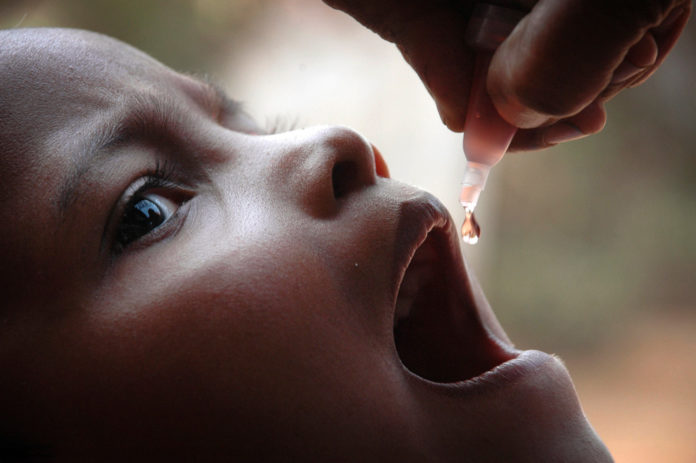New Delhi (NVI): With Massive disruption in routine healthcare services due to the Covid-19 pandemic, the Indian Government, in collaboration with UNICEF has been trying hard to ensure that immunization coverage for children is not affected by the unprecedented Covid challenges.
In this direction, stories from Maharashtra, that is the worst-affected state due to the pandemic, and various other states in India, are inspiring.
WHERE THERE IS A WILL, THERE IS A WAY
To start with, we have a story of strength from Maharashtra’s Nandurbar district, where a district coordinator left no stone unturned in making the members of local ASHA and SHG (Self Help Group) members aware of the importance of immunisation to children amid the pandemic phase.
Meet Archana Desale, District Coordinator of Nandurbar in Alliance for Immunization and Health (AIH). While sharing her story, Archana says that her organisation Alliance for Immunization and Health is been working to strengthen the CBOs (Community Based Organisations) and and CSOs (Civil Society Organisations) in 5 districts of Maharashtra and district Nandurbar is one of them.
“From the first phase we have been training the SHGs and MAS members of the community on routine immunization and hand washing. And during the second phase, the lockdown due to COVID situation started and we began virtually training the members on COVID-19 prepardness and management along with recapitulation of RI and hand washing.
“During the virtual training I was not able to reach few intervention pockets as the SHG members did not have phones. So I decided to visit two of the intervention pockets (Hariyali gate and Bhedwanall) in Sahada block Nandurbar,” Archana says while sharing one of her experiences during the visit.
When she reached Shahada town in Nandurbar, she was informed by the an ASHA worker that the SHG workers in the area were engaged in other means to earn their livelihood since the Covid-19 situation left many people jobless.
With much effort, Archana was able to reach a muddy field where the ladies engaged in SHG services were toiling hard for at least 8 hours in the fields to get their daily wages. In the first instance, the contractor was adamant to let Archana meet the workers but she somehow managed to reach the road near the field where they were working on an autorickshaw.
She finally met the 11 SHG members in the presence of the contractor at lunchtime with the promise that she will not take more than a few minutes to make them aware of Covid precautionary measures. Archana took more than an hour to take the session and even the contractor did not intervene since he too was moved by her enthusiasm.
Sairabai Padvi (SHG member Hariyali gate) said, “Thank you Madam for caring for us so much and coming so far and giving us the information. This Corona (COVID) has made our life miserable.”
Even the contractor thanked the District Coordinator of Nandurbar for her painstaking effort to come in a muddy field and dispense valuable information on the prevention of Covid-19 pandemic and immunisation.
MY COMMUNITY, MY RESPONSIBILITY
The next story is from Chopan block in Sonebhadra district of Uttar Pradesh. Anju Chuadhary, a Teeka sakhi fo Maa Kaali Self Help Group in village Tapu of Chopan block in the UP district received training on routine immunization and hand washing with soap in November 2019 under the AIH-UNICEF project.
When the Covid-19 pandemic hit the entire nation, routine immunization got effected in Uttar Pradesh as well. At such a time, Anju got trained on COVID-19 interventions through online training on 29th May and received IEC on her WhatsApp. She was told to communicate these COVID-19 messages to as many community members as she can to protect her village, community members and family from getting infected with COVID-19.
Going a step ahead in her pursuit to make her community and village Covid free, Anju did orientation in her village on 1st and 2nd June and oriented 12 women each day on COVID-19, total 24 other women were oriented.
Further, these 24 women reached 79 community members with COVID-19 messages and prepared their community to respond correctly during COVID-19.
I AM A CORONA WARRIOR
Another story is of Sulekha Devi from lama village of Fatehpur block in Gaya district of Bihar. Sulekha became member of Jeevika group in 2013 and was selected as community mobiliser in 2014. She received training on routine immunization and hand washing with soap in first phase of project and was very active during first phase in her village. She was continuously encouraging parents to get their child immunised.
Phase – II of the project had different programming structure due to COVID-19. Sulekha Devi received her training on 19th May virtually and had active participation in a virtual training.
After receiving training on 22nd May, Sulekha came to know that three migrant labourers from Kolkata and one migrant labourer from Ranchi have arrived into her village. These migrant labourers were not willing to go to quarantine center as their home did not had adequate facility to be home quarantined, and wanted to live with their family.
Then Sulekha Devi with other SHG members went to them and advised them to go to quarantine center to save their family and village from any possibility of getting infected from COVID-19 and also informed in-charge of quarantine center of Nawgawn and those 4 migrant labourers went to quarantine center after understanding the importance of being isolated from the family in adequate facility.
IMMUNIZATION – A basic right of every child
The next case story is from maoist affected area of Dantewada in Chhattisgarh’s, where the team of Alliance for Immunization Health (AIH) met Laxmi Kunjam, an SHG member, in June.
Her residence is at village Koriras of Katekalyan Block of Dantewada district, a project village affected by Maoists. The village was challenging to the Rural Health Organizer (RHO) for immunization coverage because many lactating women were reluctant to get their child immunized despite many efforts of counselling.
The reluctance was due to the prevailing myths and misconceptions that a child gets fever and other health issues, after immunization. However, this trend has reversed now and Laxmi has a significant and vital role in this reversal, as expressed by the RHO and other fellow women SHG members.
During the meeting with AIH members, Laxmi was oriented and mobilized by the district coordinator during AIH interventions and has been actively engaged in tracking the children for immunization, sensitizing the people on COVID-19, supporting the RHO during Village Health and Nutrition Day (VHND) sessions and coordinating with other SHG groups in the village on various activities.
After getting orientation on Routine Immunization (RI), handwashing and COVID-19 from Babita, the district coordinator of AIH, Laxmi was motivated and started associating with the RHO in every VHND session and helped the ASHAs in bringing the children to the session for Immunization. She was linked with the Panchayati Raj Institution (PRI) and RHO by Babita and allowed to take sessions in the training programmes.
She met a lactating mother and found that the child is not immunized. She traced the reason and realized that there is a fear amongst some mothers of distant hamlets that the child gets fever and becomes sick after immunization. Tracking system of children, introduced by the AIH team is being updated with the help of Rural Health Officer and Mitanin (ASHA worker) to track every child in the village for ensuring immunization with necessary pre-alert, counselling, sensitization and peripheral support.
When she started updating the register and tracking the children for immunization through the tracking system, she realized that there are many missing children for immunization due to the fear of their mother. She felt that counselling to mothers and clarifying their doubts is the need of the hour.
Immediately she took note of this and started reaching the mothers for counselling, who skipped immunization of their children on account of fear. She faced resistance from the villages initially because they used to think that Laxmi is getting extra incentives for this and for earning more money, she is unnecessarily pressurizing the mothers for immunization even though it has side effects.
To convince them, she approached other SHG members, the PRI members and Mahila Panch to make home-visits to those mothers and counsel them on the importance of Routine Immunization.
She visited every house having children below 23 months and clarified their doubts and communicated that the fear is not correct and this will increase the risk of the child from diseases. Through the tracking system, she has mapped all the children in the village below 23 months and ensures that every child is immunized during the VHND sessions.
In the month of June, she conducted inter-personal communication with more than 80 mothers in the village and its surrounding villages. In total she has brought back 6 such missing cases in Koriaras village to the VHND sessions. She along with other SHG members contacted every missing child in the village and bring them to the VHND session for immunization.
“Ham nahi chahte ke hamare gaon me ek bhi bachha tikakaran se chut jai. Isliye ham hamesha iske baare me sochte rahenge” ( we don’t want even a single child should be missed for immunization from our village. We will keep thinking on this line always) – says Laxmi.
Today, the entire village is free from the invalid myths and every child is immunized. Lactating mothers became health conscious about their children and the RHO along with PRI are very particular about the VHND sessions. This thinking is influencing the nearby villages and is noticed by the health department. The efforts of Laxmi and the SHG members is recognized and appreciated in the department.








